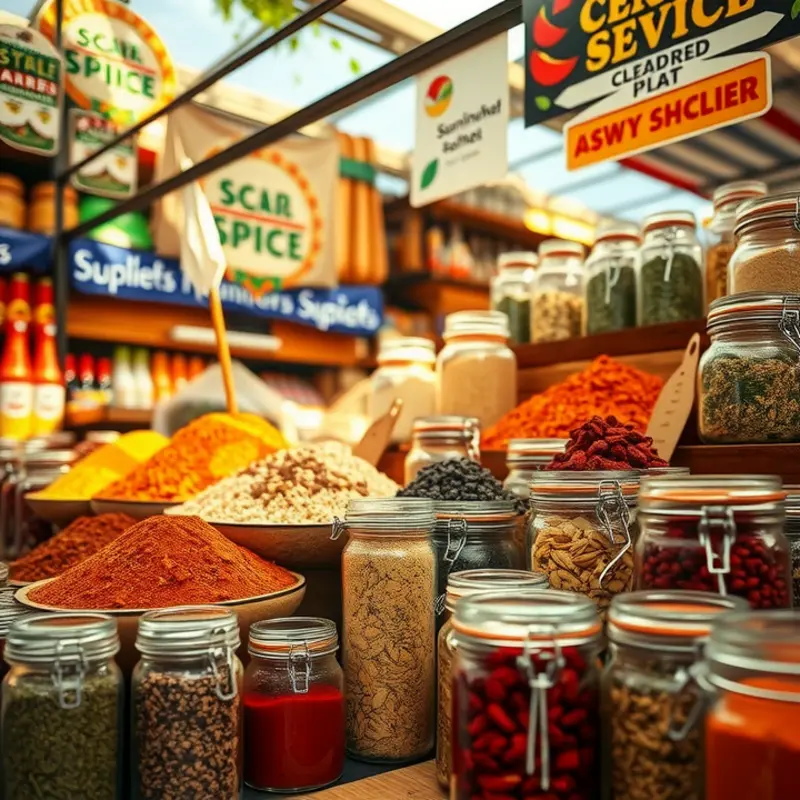Spices are essential to enhancing flavors in our meals, but the process of sourcing them can impact the environment and communities. With rising awareness about eco-friendly food choices, the ethical sourcing of spices has gained importance. This guide unfolds the complexities of spice sourcing and offers practical steps to ensure that your culinary endeavors are both tasty and sustainable.
Understanding Ethical Sourcing: Why It Matters

Ethical sourcing in the spice industry involves ensuring that production and purchasing practices are environmentally sustainable and socially responsible. This holistic approach considers the well-being of farmers, the environment, and the economies that depend on spice cultivation. Spices are often grown in biodiverse regions; hence, their production has significant environmental and social impacts.
Environmental Implications
Spice cultivation can affect biodiversity and soil health. Unsustainable farming practices lead to deforestation and erosion, disrupting ecosystems. Ethical sourcing requires promoting sustainable agricultural practices, such as crop rotation and organic farming, reducing chemical use, and conserving water. By supporting these practices, consumers help preserve ecosystems and promote biodiversity.
Responsible sourcing also involves proper waste management and reduced carbon emissions. Transport and processing of spices can contribute to air pollution and waste. Choosing spices from suppliers that minimize their carbon footprint helps mitigate climate change impacts. Practicing eco-smart kitchen storage can complement these efforts by reducing waste at home.
Social Implications
Ethical sourcing seeks to improve the livelihoods of farmers and workers in the spice industry. Fair trade initiatives aim to provide fair wages and better working conditions. These initiatives offer improved living standards and economic stability for local communities. Providing farmers with resources and education about sustainable practices is also vital to ethical sourcing.
Exploitation and child labor remain challenges in regions where spices are produced. Ethical sourcing commitments, such as child labor-free certifications, help ensure workers’ rights are respected. Supporting companies with transparent supply chains can pressure other businesses to adopt fair practices, creating industry-wide change.
Advantages of Ethical Sourcing for Consumers
Consumers who prioritize ethically sourced spices contribute to a fairer and more sustainable industry. They enjoy high-quality products that are less likely to be contaminated with pesticides and other chemicals. Moreover, ethical sourcing often involves traditional cultivation methods, resulting in richer flavors and improved nutritional profiles.
Purchasing ethically sourced spices allows consumers to use their buying power for good. This economic influence encourages broader adoption of sustainable practices across the food industry. Linking our spice choices to the broader concept of sustainable consumption means embracing responsibility for global impacts.
In conclusion, understanding ethical sourcing and its significance allows consumers to make informed decisions. These choices can lead to positive changes for the environment and for the people who provide our food. Encouraging a culture of conscious consumption can drive long-lasting benefits for the planet and its inhabitants.
How to Make Ethical Choices While Shopping for Spices

Choosing ethically sourced spices goes beyond enhancing the flavor of your meals; it transforms your cooking into an act of global sustainability and fairness. Making informed decisions while purchasing your spices can significantly impact both the environment and the lives of the farmers who cultivate them.
First, look for certifications on labels that signify ethical sourcing. Certifications like Fair Trade, Rainforest Alliance, and Organic can be indicators of ethical practices. Fair Trade ensures that farmers are paid fairly and work in safe conditions. Rainforest Alliance focuses on conservation and biodiversity, while organic certifications signify minimal use of synthetic pesticides and fertilizers.
Understanding these labels can be overwhelming. Focus on learning one or two at a time, asking questions and investing in brands that align with your values. Many brands offer transparency regarding their supply chain, so exploring company websites or contacting customer service for detailed practices can further clarify your choices.
Beyond certifications, seek out local spice shops or cooperatives. These often source directly from farmers, providing more profits to the producers. When you can trace your spices back to the farmers, it ensures a closer connection to the source, encouraging fair compensation and sustainable practices.
Another crucial aspect to consider is the environmental impact of the spices you purchase. Spices often travel long distances from farm to table, which involves significant carbon emissions. Opt for locally grown spices when possible, reducing the carbon footprint associated with transportation. Exploring seasonal spice blends or locally available culinary herbs can serve as excellent substitutes.
Awareness of the sustainability of ingredient sourcing can be further expanded by diversifying your spice cabinet thoughtfully. Rather than stocking up on every spice, focus on a handful known for ethical sourcing. This mindful approach not only contributes to sustainable consumption but also enhances your culinary creativity.
For a shared community experience around ethical spice sourcing, engage with online or local culinary groups that emphasize sustainable and ethical eating habits. These networks can provide valuable recommendations and insights into brands that prioritize sustainability.
Educating yourself about sustainable spices doesn’t end with selection. How you store and preserve your spices also impacts waste. Vibrant, long-lasting flavors result from proper storage, reducing the need for frequent replacements. Our guide on eco-smart kitchen storage offers practical tips to maintain freshness and minimize waste.
The quest for ethically sourced spices invites you to explore global flavors while honoring the earth and its people. By making informed choices, your kitchen becomes a hub of sustainability and delicious possibilities.
Final words
Choosing ethically sourced spices is a vital step towards a more sustainable food system. By understanding the implications of spice sourcing and following practical shopping tips, you actively support eco-friendly practices and contribute to better environmental and social outcomes. With every meal, you can celebrate flavors while fostering the values of sustainability. Make choices that resonate with your values, knowing that each spice you select carries a story of responsibility and respect.








